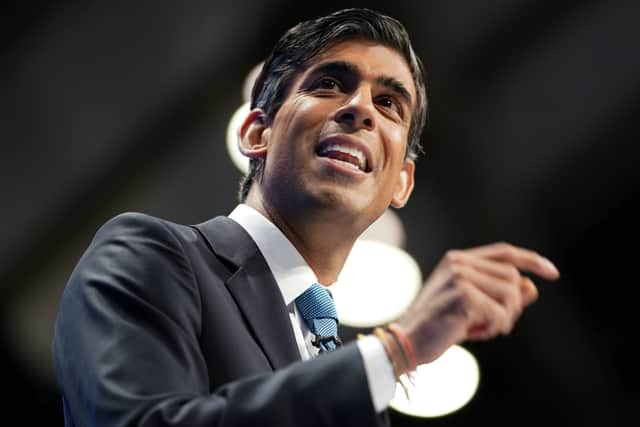This is what you need to know about today's Universal Credit changes


The Government has brought in changes to the Universal Credit benefits system today (24 November).
As was first announced by the Chancellor Rishi Sunak in October’s Autumn Budget 2021, two million people with low-incomes will now receive what is effectively a tax cut.
Advertisement
Hide AdAdvertisement
Hide AdAlongside increased funding to support new parents with their childcare, the changes form part of a bid from the UK Government to show it is supporting working families.
But the announcements came just weeks after the Government ended the £20-a-week uplift in the benefits payment that was introduced in response to the Covid-19 pandemic.
So how has Universal Credit changed - and will benefits claimants be better off than they were when the Covid uplift was in force?
Here’s what you need to know.
What is Universal Credit?
Universal Credit is a benefit payment for people over the age of 18 but under 65-years-old - i.e. state pension age.
Advertisement
Hide AdAdvertisement
Hide AdThe benefit has a standard allowance that applies to claimants, the size of which depends on their age and whether or not they have a partner.
This allowance can be topped up further if the person withdrawing it has children, a disability and/or needs help paying rent.


It was announced by the Coalition Government in 2010, as it sought to simplify the benefits system by rolling a range of different schemes into one.
UC started rolling out from 2013 and, according to the latest Government statistics, was supporting 5.9 million people across the country in the second quarter of 2021.
Advertisement
Hide AdAdvertisement
Hide AdA £20-per-week uplift to UC was introduced in March 2020 to help new claimants to adjust to the extra costs created by the coronavirus pandemic.
But this was brought to an end by the Government at the beginning of October 2021.
What has changed?
In his Autumn Budget 2021, Rishi Sunak said he would alter the Universal Credit taper rate.
This rate is the amount of benefit that’s taken away if the claimant earns money above their work allowance - the amount of money you can earn without a reduction in your benefit.
Advertisement
Hide AdAdvertisement
Hide AdIf you and your partner have kids, and/or are living with a disability that restricts how much you can work and also get help with your housing costs, the allowance is £293. If you don’t get housing support, you get an allowance of £515.
Previously, for every £1 a UC claimant earned above their work allowance, 63p was taken away.
But the Chancellor said in his speech that this was a “hidden tax on work” and announced that he would cut the taper rate by 8%.
So, this taper has been reduced to 55p, meaning claimants can keep an extra 8p per £1 of net income.


Here is what that means in practice.
Advertisement
Hide AdAdvertisement
Hide AdIf you earn £500 a month, have a child and get money for housing costs, the £207 outside of your UC work allowance will now be reduced by £113.85 rather than £130.41.
The Government hopes this reduction will provide more of an incentive for people in jobs who claim UC to increase their working hours.
“Organisations as varied as the Trades Union Congress, the Joseph Rowntree Foundation, the Resolution Foundation, the Centre for Policy Studies and the Centre for Social Justice, have all said [the taper rate] is too high,” Mr Sunak said in his Budget speech.
“So to make sure work pays and help some of the lowest income families in our country keep more of their hard-earned money, I have decided to cut this rate not by 1%, not by 2%, but by 8%.
Advertisement
Hide AdAdvertisement
Hide Ad“This is a £2bn tax cut for the lowest paid workers in our country. It supports working families, it helps with the cost of living and it rewards work.”
In addition to the taper rate cut, the amount households with kids or a household member with limited capability for work can earn before their UC payments are reduced will also be raised by £500 a year.
Do I need to login to benefit from the Universal Credit changes?
According to the Government, the changes will affect around two million working people.
And by bringing the changes in a week earlier than originally stated, the Department for Work and Pensions (DWP), which oversees UC, said half a million people will be able to benefit before Christmas.
Advertisement
Hide AdAdvertisement
Hide AdThe department said claimants would be notified about any changes to their benefits from Wednesday (24 November) and that these changes would then be applied automatically.
To see how the changes affect your benefits, you can login to your Universal Credit account via the Government website.
Do the changes compensate for the £20-a-week reduction in UC?
While Rishi Sunak has said his proposals would see close to two million families keep an extra £1,000 a year on average, the announcement does not compensate for the end of the £20-a-week UC pandemic uplift or change anything for people who are unemployed.
“[It] doesn’t cushion the blow of the £20-a-week cut for those still looking for work or the 1.7 million unable to work because of disability, health issues or caring responsibilities,” said head of policy at Citizens Advice Morgan Wild.
Advertisement
Hide AdAdvertisement
Hide Ad“Given the cost-of-living crisis, the Government must ensure every family is able to access the support they need this winter.”
It’s estimated that the uplift helped around 700,000 people stay above the poverty line during the pandemic.
The Government’s decision to scrap it was met with heavy criticism.
Additional reporting by PA